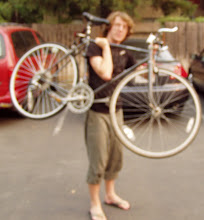When I wrote my first comprehensive cocktail post I figured I needn't post how I made those classic cocktails. I mean, they're classics, right? Two years experience being over twenty one and I know differently. I don't go to bars very frequently, but I've ordered two Martinis. First of all I had to specify and confirm that I wanted them made with gin. When I finally got my Martini, not only was vermouth almost nonexistent, but the drink was iced so thoroughly that instead of tasting like uncomplemented gin it tasted mostly like ice water. That's for both instances. One of those was from Sophia's and cost $7. Their Mojito was also off-balance (mostly mint and soda water). At a bar in Dublin (CA) I ordered an Old Fashioned and was similarly displeased.
It seems to me that bartenders accustomed to "pinky up" drinks that are incredibly hard to mess up are now ruining the last respectable cocktails on the house books. Fine cocktails are difficult to balance and I suppose bartenders have incentive to make drinks as quickly as they can, but I don't mean it lightly when I say they were nearly undrinkable. All of those drinks were travesties. I know there are good bars out there that still take cocktails seriously. I've promised myself to investigate one sometime when I have the extra arm and leg required to pay the tab. Until then, I'm going to err on the side of beer. They still haven't figured out how to mess that up.
Those of my readers who've been around the block are welcomed to weigh in here. I could be totally off-base. For those pinky-uppers and non-cocktail-drinkers among you, don't hold bar failures against a good cocktail.
The Martini was the first cocktail Brandon and I got into. It took us awhile to get the proportions right and it took us awhile to figure out how to drink them properly (small sips, guys). Though we did the vermouth by eye, we learned quickly enough what amount made a good Martini. That amount ended up remarkably close to IBA specifications: one shot gin, one quarter-shot dry vermouth. When done right, as you roll the fiery liquid around your mouth, you can bask in the divine balance of sharp juniper with the nutty/fruity/spicy flavors of vermouth.
Since our early days using Seagram's Gin for our Martinis, Brandon and I have moved to "swanky" gins, which really comes down to deciding between Bombay Sapphire and similarly-priced Tanqueray. I'm partial to the latter as it tastes more like gin. I don't think the flowery flourishes of Bombay Sapphire lend themselves to Martinis, though they work better in Gin and Tonics (one of the more foolproof cocktails, fyi).
So, my rules for Martinis are as follows:
-When left unspecified, a Martini is made with gin, not vodka.
-"Martinis", as a category, includes various vermouth-containing cocktails such as the Vodka Martini and the Dirty Martini, which is to say "Martinis" do not include most cocktails served in martini glasses or with the suffix "-tini". Too many times have I heard beer or whiskey snobs refer derisively to "Martinis", alluding to their syrupy ways, and it gives me a sad.
-Vermouth should make a 1:4 ratio with the gin unless specified "dry" or "wet", which I do not recommend and I certainly don't recommend starting off with.
-The gin should be shaken or stirred with ice straight out of the freezer and for a short period of time. The primary ingredient in a Martini should be gin, not melted ice.
Brandon and I also took the foundation for our Manhattans from the IBA via wikipedia. I've found the ratio of vermouth to liquor is a little more forgiving than with Martinis (unlike dry, sweet vermouth is pretty good on its own). We ended up eyeballing about the same amount of vermouth for both Martinis and Manhattans.
My dad serves Manhattans on the rocks without bitters rather than the IBA-recommended straight up. He's also a fan of a variant he picked up from my Wisconsinite maternal grandfather, Grandpa Pee Wee, which uses sweet white vermouth aka Bianco. Between the ice, the lack of bitters and a more liberal application of vermouth, the whole thing comes out much milder than my don't-shake-it-too-long-or-it'll-be-watery Martinis and Manhattans. Personal taste aside, my dad makes an excellent Manhattan, which I guess is a testament to the drink's flexibility.
I'd also like to mention the Sazerac, which is reputed to be the oldest cocktail and the catalyst for the first time I stocked a bar. It's how I got into rye whiskey. While there is no IBA-official recipe, I'm very happy with the Wikipedia recipe. I often simplify the process to resemble how I make Martinis/Manhattans (though the Sazerac is more complex), but I've found that it is absolutely necessary to first add the Absinthe/Herbsaint (or Pastis or any anise-flavored liquor) by coating the glass. I've also found that releasing the lemon peel's oils onto the drink is essential for the overall effect.
Other, also respectable, cocktails that lean harder on water and sugar are more forgiving to make and more approachable for those with weak palates, but there's nothing like classic straight up cocktails with that heady mix of spices, fruits, herbs and aromatics only they have to offer. Nothing else takes the taste of alcohol to such a pure, high glory.
Subscribe to:
Post Comments (Atom)

No comments:
Post a Comment